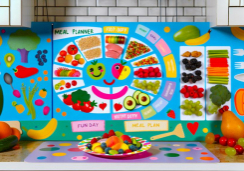Beginner's Guide to Low-Carb Meal Planning
You might think that starting a low-carb diet means saying goodbye to all your favorite foods, but that's not the case. With a little creativity and planning, you can enjoy satisfying meals that align with your health goals.
In this guide, you'll learn how to prepare low-carb meals that aren't just a plate of greens. We'll cover the essential foods to stock up on, how to craft a meal plan that won't leave you feeling deprived, and the tricks to keep you on track.
But before you start envisioning your new menu, it's crucial to understand why reducing carbs can be beneficial and how to do it without compromising your nutritional needs. Stick around, and you'll find out how to navigate the initial transition and what to expect as your body adapts to this new way of eating.
Understanding Low-Carb Diets
To effectively embark on a low-carb diet, it's essential to grasp that it's not just about cutting back on carbs, but also about properly balancing your intake of protein and fats. When you're crafting a low-carb meal plan, you're reducing your intake of sugars and starches and not fearing fats. Studies support the inclusion of natural fats, suggesting they shouldn't be dreaded within a low-carb diet.
Low carbohydrate diets can vary in the grams of carbohydrates per day they allow. Some are strict low carb diets like keto, which may induce ketosis by significantly limiting carbs and upping fat intake. However, not all low-carb diets aim for ketosis. You'll typically focus on low carb foods that provide energy without the high carbohydrate count.
The impact of these diets on body weight has been widely recognized, with many finding success in weight management. When you eat on a low-carb plan, you're not required to count calories or weigh your food obsessively. Instead, you listen to your body, eat when you're hungry, and stop when you're satisfied, paying attention to the grams of carbs and the nutrient content of your meals to maintain a balanced diet.
Essential Low-Carb Foods
Filling your plate with essential low-carb foods like meats, leafy greens, and healthy fats is the cornerstone of building a nutrient-dense, low-carbohydrate meal plan. On a low carb diet, you're aiming to reduce your carbohydrates per day, focusing on foods that provide the most nutrients without excess calories. This strategy can be particularly effective for weight loss, as you replace high-carb foods with options higher in protein and fats, which can keep you feeling full longer.
Incorporate a variety of meats, fish, and eggs into your eating routine for protein. Vegetables that grow above ground, such as spinach, kale, and broccoli, are low in carbs but rich in vitamins and minerals. Don't shy away from natural fats; avocados and nuts are excellent sources of healthy fats and make a great snack.
When planning your meal plan, avoid foods high in sugar and starch, like bread, pasta, rice, beans, and potatoes. Instead, explore delicious low carb recipes that include your essential foods. If you're looking for a more structured approach, consider a personalized meal plan that caters to your specific dietary needs and goals.
Crafting Your Meal Plan
Crafting a low-carb meal plan starts with selecting a diverse array of proteins, fats, and fibrous vegetables to ensure nutritional adequacy and satiety. You'll want to focus on meats, fish, eggs, and above-ground vegetables while incorporating healthy fats like avocados and nuts. This balance is crucial to maintain energy and support your diet for weight loss or other health goals.
Here are key steps to consider:
- Identify Your Daily Carb Limit: Aim for a specific number of grams of net carbs per day, which can vary from 20-50 grams for keto meal plans to slightly higher for other low-carb diets.
- Select Carb Recipes to Choose From: Plan your meals around low-carb recipes that excite your taste buds and keep you satisfied.
- Consult a Registered Dietitian: Especially if you're new to this, plan with a FREE session from a dietitian to tailor meal plans designed for your unique nutritional needs.
Remember to read food labels carefully to avoid hidden sugars and high-carb ingredients. Meal prep can help you stick to your low-carb goals and curb the temptation to eat low-quality foods. Consult with healthcare providers to adapt your meal plan, especially if you have specific health conditions such as diabetes.
Overcoming Common Challenges
When embarking on a low-carb diet, you may encounter challenges such as the 'keto flu,' but understanding how to manage these hurdles is key to your success. Symptoms like headache, fatigue, and irritability are common as your body adapts. To mitigate these, ensure you're staying hydrated and getting enough salt, which can help balance electrolytes.
In your plan, read food labels carefully to avoid hidden sugars and high-carb ingredients that can sneak into your diet. This is a crucial low carb challenge, as many products may appear healthy but are counterproductive to your goals. You'll want to make sure you're not just cutting carbs but also focusing on the quality of the foods you eat.
It's not always necessary to count calories on low carbohydrate diets, but being mindful of your intake and portion sizes can help. Preparing meals in advance is one of the best tips to make your diet easier and more consistent. By having ready-to-eat, low-carb options at hand, you're less likely to make unhealthy choices.
Lastly, getting professional guidance can be invaluable in adjusting your diet to meet your individual needs. Remember, each person's body is unique, so what works for one may not work for another. Tailoring your approach can make all the difference in overcoming the low carb challenge.
Maintaining a Low-Carb Lifestyle
After mastering the initial challenges of a low-carb diet, it's crucial to establish sustainable habits that support a long-term low-carb lifestyle. To keep on track, you'll need to integrate strategies that align with your eating plan, ensuring you not only lose weight but also maintain your health without feeling deprived.
To help maintain your low-carb lifestyle, consider these key points:
- Stay Informed About Carbs: Understanding the carbs per day that work for your body helps in meal planning. Aim to include nutrient-dense, low-carb options like cauliflower rice instead of high-carb grains.
- Prioritize Protein and Whole Foods: Consuming adequate grams of protein is vital for satiety and muscle maintenance. Pair proteins with whole foods like vegetables to feel satisfied and nourished.
- Plan and Prepare: Keep low-carb snacks on hand and prep meals in advance. This helps you avoid high-carb temptations and manage your calories per day more effectively.
Frequently Asked Questions
How Do I Start a Low-Carb Diet for Beginners?
To start a low-carb diet, focus on carb counting, adjusting macronutrient ratios, and understanding ketosis basics. Plan meals, prioritize grocery shopping, control portions, value fiber, stay hydrated, and make smart snack choices when eating out.
What Can You Eat the First Week of a Low-Carb Diet?
You'll enjoy eggs for breakfast, cheese snacks, and avocado slices. Include leafy greens, grilled chicken, and broccoli stir-fry. Opt for a salmon fillet, use almond flour, coconut oil, and zucchini noodles for variety.
What Are 5 Foods to Avoid on Low-Carb Diet?
You should avoid bread, pasta, high-carb snacks, sweetened beverages, and starchy vegetables to maintain a low-carb diet. Instead, opt for bread alternatives, pasta replacements, and watch for hidden sugars in condiments and tropical fruits.
What Is the Number 1 Carb to Avoid?
You should primarily avoid sugar when carb counting. It's high on the glycemic index, often hidden in snacks, and prevalent in high carb drinks and processed foods, overshadowing fruit sugar content and starchy vegetables.
Conclusion
You've learned the basics of low-carb meal planning—embracing foods high in proteins and fats while limiting carbs.
Tailor your plan to fit your lifestyle, ensuring it's sustainable and nutritionally balanced. Remember, challenges are part of the journey, but with the right strategies, you can overcome them.
Stay informed, adjust as needed, and listen to your body. A low-carb diet isn't just a fad; it's a pathway to a healthier you.
Keep pushing forward!










